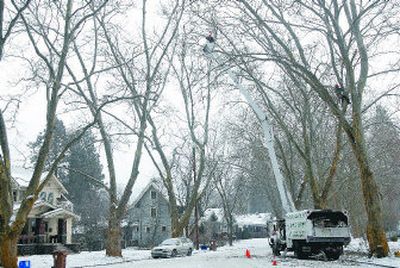Pruning for tree health

The sycamores on Spokane’s South Hill have been growing along sidewalks for nearly a century.
They’ve provided shade in the summer, piles of leaves to jump in during the fall, and bright green canopies of leaves in the spring.
Also known as London planes, the trees in the neighborhood are susceptible to anthracnose, a fungus that attacks leaves, twigs, buds and shoots. The fungus appears as rounded dead spots.
The trees also bore some damage from Ice Storm ‘96.
One neighborhood is providing the trees with some much-needed pruning so residents can continue to enjoy them for seasons to come.
Homeowners in the 600 and 700 blocks of West 20th Avenue have contracted with Northwest Plant Healthcare to get their trees pruned at a discounted rate.
The project got off the ground when Carrie Anderson, an advocate for trees known as the “Tree Lady” and director of the Urban Forest Council, moved into the area and started to worry about the old London planes.
The Urban Forest Council, a program of the Lands Council, works with groups, citizens and governmental agencies to save and enhance urban and community forests.
The trees needed to be pruned, and, according to city law, it’s homeowners who are responsible for getting that done.
Through the council, Anderson surveyed the neighbors to measure their interest and contacted Joe Zubaly, owner, president and arborist at Northwest Plant Healthcare. He provided an estimate and agreed to a discounted winter group rate of 30- to 40 percent off for the neighborhood.
Anderson said the main cost of bringing an arborist out to prune trees is the cost of hauling heavy equipment to where it is needed. With several households using the service, the neighborhood could get the group rate.
Fliers were distributed, and the neighbors signed up. Zubaly said that once the project was under way, many more homeowners approached him to prune their trees.
The workers removed dead wood and cut down branches.
The original plan was for the homeowners to take care of the cleanup after the pruning, but in many cases the job was too large. Zubaly adjusted his rates and took care of that for the homeowners, too.
“I consider it a small miracle on our street,” Anderson said of the project.
Despite the cold weather, winter is a great time to prune. Zubaly said he can get a better view into the trees to see the structure of the plant. He also has an easier time getting around among the branches.
Both Anderson and Zubaly hope the pruning project is just the beginning. Zubaly has plans to approach neighborhood councils to let communities know this service is available.
The two want to ensure the health and longevity of trees living in all areas of Spokane.
Anderson worries that if the plants don’t survive, they either won’t be replaced, or if they are, they take many years to grow into mature trees.
Jeff Perry, the Spokane city arborist, said residents aren’t allowed to prune anything above their heads. Bigger projects must be completed by a certified arborist, and there are 15 to 20 city-approved arborists who work in town, Perry said.
Anderson obtained the proper permits for the project, and when it’s completed, the city will inspect the work.
“The trees’ health is number one,” Perry said.
Zubaly and his crew worked in the neighborhood for 12 days and pruned 28 trees.
“It’s great for the neighborhoods,” Zubaly said.